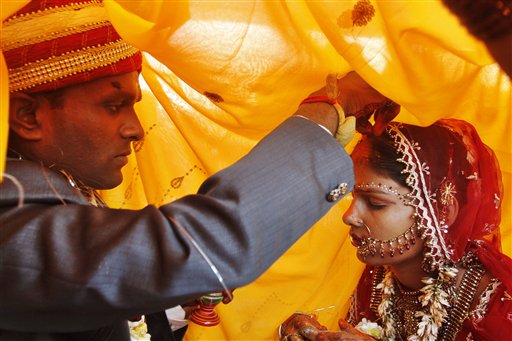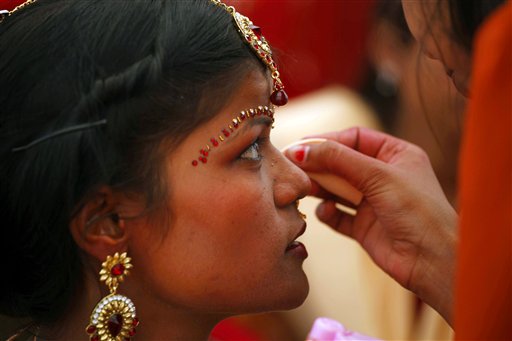Brides lured from India under false pretenses face abuse and dowry fraud
By Siri Bulusu

Brides lured from India under false pretenses face abuse and dowry fraud
By Siri Bulusu
He’s an Indian-born software engineer living in America. She’s an Indian woman of marrying age. Their families agree they’re a good match and arrange a marriage.
When unions are made in living rooms over chai and samosas, one question is rarely asked: “Do they love each other?” Though a better question may be, “Do they know each other?”
Arranged marriage, what seems like an antiquated tradition in the West, is still widely practiced in India. Families see arranged marriage as an opportunity to advance their economic and social standing. A “good match” secures a future for both the bride and groom: She has a home, economic security, and is no longer a burden on her parents. The groom’s family is guaranteed a new homemaker.
But sometimes what looks like a ticket to a new life and the American dream becomes a life of forced labor, domestic abuse or worse. Suitors sometimes steal dowry money, leave their new wives stranded foreign countries — and in the most severe cases — force their brides into slavery or human trafficking.
Online dating, the Indian way
The process often begins on sites like Shaadi.com or BharatMatrimoney.com. Non-Resident Indian (NRI) men are usually the most sought after on these sites. Grooms advertise good jobs, fair skin and progressive ideals. Searches for brides are narrowed down to language, state, religion and caste (some having up to 21 sub-castes). Newspapers ads are also a common venue for arraigning marriage. This sort of advertisement, so common now, has found its way into popular culture.
Ashwini Dhongde’s poem “Matrimonials” highlights the discrepancies between what is required of brides versus their grooms, and the subtlely oppressive nature of marriage ads:
Wanted - a bride
Highborn, from a well-to-do family
(able to provide an excellent dowry and suitable gifts)
Hard-working and modest
Able to adjust to a joint family, no foolish ideas
(the wind of women’s lib not having gone to her head)
Wanted - a groom
No conditions.
(must be a male)
Adult, either marrying for first time or
A widower with children, anyone will do.
NRIs often seek out “traditional” women, so that once they make the move to America, they don’t get caught up in “western ideas.” When married women do speak out against their husbands, the situation often turns violent.
The Indian Government published Marriage to Overseas Indians: A Guidebook to aid families looking to fix a marriage with an NRI and avoid a potentially abusive union. In the chapter titled “Preparing for Marriage: What to expect going to a different Country,” the book gives useful tips like:
During the severe cold weather, spending time outside one’s home is nearly impossible. Staying home for prolonged periods of time can result in boredom and feelings of isolation and depression.
But the more surprising, and disturbing, bits of information include:
Try to know your spouse well, learn about where he/ she lives before you arrive there and develop reasonable expectations. Communication is the key to a successful marriage. Understand what you are getting into.
Learn about the Domestic Violence law that has been passed by the legislature. Acquire an in-depth knowledge of “mental cruelty and dowry harassment” under section 498A of the Indian Penal Code.
The depths of deceit
Dr. Ranjana Kumari, executive director of The Center for Social Research in Delhi and President of the Women Power Connect, contributed to the guidebook. She became aware of fraudulent and abusive NRI marriage after a woman in her office fell prey to the situation. “When they were getting ready to leave for the states, he told her to give him her jewelry so he could keep it safe,” Kumari recounted. “She thought she’d be following him on a later flight, but when the time came to claim her ticket, there was nothing. He used a fake name, a fake family, a fake job. There was nothing she could do.”

Cab drivers will pretend to be doctors, franchise owners will pose as successful businessmen. But their financial status is nowhere near secure enough to support the education often promised to their new brides. Instead, they force women to work without pay in their business. Neha Gill is director of Legal Services at Apna Ghar (Our House), an organization providing free, holistic services to women and children across immigrant communities in the Chicago area. She says the abuse starts with the questions. “Once the women begin speaking out, [the men] limit the finances of their spouse to keep them dependent. When the women threaten to report the physical abuse to the police the men scare them by saying she will be deported if the police find her.”
Dowry harassment is another means of abuse. Despite dowry being outlawed in India in 1961, men will still go to great lengths to obtain dowry offerings. This phenomenon in NRI men is particularly manipulative, according to Gill. “During the arrangement phase of the marriage proceedings they will pretend to have progressive western views on dowry and refuse any sort of offering,” Gill said. “Once the marriage is over they begin harassing their wife, insulting her family for being cheap and cheating him out of his entitlement.” Again, they turn to physical violence and divorce is never the first consideration. “They are embarrassed to go back to India as divorced women. It is a humiliating position for them to be in,” Gill said. “Pakistani women especially feel they don’t have the right to divorce their husbands … they're doomed to this life.”
A way out?

Apna Ghar works with the Consulate of India to administer Indian government programs in Chicago to remove these women from their seemingly helpless situations. Typically, women discover the organization through word-of-mouth or are referred by another community-based organization. Gill said that these women are usually not already divorced, though sometimes already living apart from their husbands. “We help them file for divorce and depending on the severity of abuse we get the police involved,” said Ghar. Unfortunately, there is no way to charge a man for tricking a woman into marrying him, but “in the cases assault and battery, we move forward with prosecution.” Once the proceedings are underway, the organization assists the women in starting a new life, living independently in the U.S.
According to the Center for Social Research, the Indian government needs a law that deals comprehensively with NRI related marriage fraud: “Amending current laws and introducing new rules and regulations would help victims of NRI marriages reclaim their fundamental rights to property, equality in marriage, the protection of family, freedom from inhuman or degrading treatment, and above all, dignity.”

